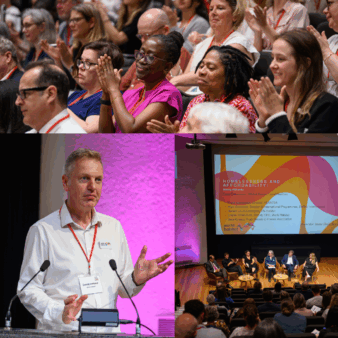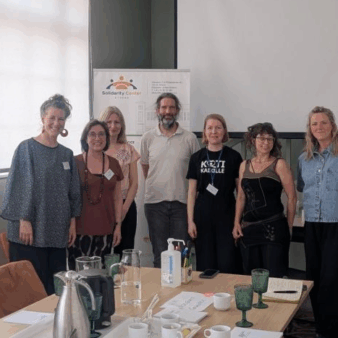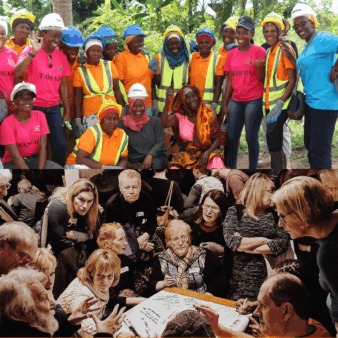
Ryan Conlin is Chief of Staff at EarthEnable and Vanessa Nkesha is the Executive Associate. EarthEnable was a 2018 World Habitat Awards finalist, for its success in replacing dirt floors with affordable earthen floors in rural Rwanda and Uganda.
Rwanda recorded its first confirmed case of COVID-19 on March 14, 2020.[1] At the time of writing, there were 5,665 total cases with 5,164 recovered and 47 deaths.[2] A few weeks after the first case, Rwanda imposed a national lockdown for three months. As a company devoted to improving the health of rural families through building affordable floors, we at EarthEnable were particularly worried about our customers suffering serious health impacts from Coronavirus. The rural families we serve struggle to make ends meet through subsistence agriculture and often suffer from poor health due to poor sanitation, lack of access to healthcare, and minimal disposable income. The children in rural Rwandan families are at especially high risk of contracting illnesses from playing, eating, and sleeping on dirt floors. With schools closed during the lockdown, these children spent even more time on the dirt floors in their homes. As a result, the chances for dirt floors to spread parasitic diseases, respiratory diseases, and even COVID-19, were at an all-time high.
During the national lockdown, EarthEnable repurposed our call center, continued to pay workers, and even tried to remotely train customers to build earthen floors. Our call center helps us stay in touch with our customers, by calling them to ensure they are satisfied with our products. Once Coronavirus became a threat in Rwanda, our call center reached out to as many customers as possible to educate rural families on best practices to avoid contracting or spreading the virus. Given the lack of other income options available to our employees during the lockdown, we did not lay off a single employee due to the pandemic and instead paid all employees full salaries. Finally, we used video and even phone calls to train our customers to build their own floor using nearby materials as they stayed inside their homes. These measures helped us to continue to deliver value to our customers and employees during the uncertainty of the Coronavirus lockdown in Rwanda.
After the three-month lockdown ended in June, Rwanda tentatively reopened the country. The virus continues to dominate day-to-day life: masks and hand washing are mandated in public, large gatherings are limited, and certain venues, like bars and gyms, remain closed. Fortunately, these public health measures in combination with the three-month lockdown, testing, and contact tracing, have helped Rwanda to flatten the curve. To date, COVID-19 deaths have remained relatively low, visitors have begun to return to Rwanda, and economic activity has steadily increased. The pandemic has damaged health and livelihoods across the world and Rwanda is no exception, but it has done an admirable job weathering the storm.
In the wake of the COVID-19 pandemic, providing sanitary homes for rural families is more important than ever. Studies conducted after the outbreak of COVID-19 indicate that the disease can spread through the dust from a dirt floor.[3] Longstanding evidence shows that having a sealed and cleanable floor reduces the spread of viruses within rural homes.[4] Furthermore, pre-existing diseases caused by dirt floors (e.g. respiratory infection) make pandemics like COVID-19 more fatal to families who live in homes with dirt floors.[5]
To expand our impact, improve health across Rwanda, and minimise the impact of the pandemic on our customers, EarthEnable is rapidly pivoting to a new ‘micro-franchise’ business model. Under this new model, each mason independently sells and installs our floors with materials accessible in customers’ backyards! Each mason becomes a small franchise of EarthEnable or a ‘micro-franchisee.’
Prior to the pandemic, EarthEnable directly oversaw all floor sales and construction, and was responsible for acquiring and transporting construction materials. Over time, this business model built a dedicated mason workforce, a robust quality assurance department, and vast institutional knowledge about how to sell and build earthen floors in rural markets. In late 2019 and early 2020, we first began training our highest-performing masons to sell and build floors independently. We found that when we entrusted masons to sell floors, acquire materials, and supervise their own quality, we were able to lower our prices and still deliver high-quality floors. In March, when the pandemic hit, EarthEnable was already planning a slow transition to this new micro-franchise business model.
The pandemic pushed EarthEnable to rapidly pivot to this model. To serve the poorest families in Rwanda in the wake of the economic downturn, we needed to find a way to lower the price of our floors. By empowering our masons to act as flooring entrepreneurs, we reduced our overhead costs, and directly passed those savings onto our customers. As a result, we have minimised the impact of COVID-19 on our operations and are on track to build more floors in the calendar year of 2020 than any prior year.
In total, EarthEnable has built clean floors for almost 10,000 individuals in Rwanda since the lockdown ended and is on track to reach 16,000 by the end of this year.
[1] “Tracking Coronavirus (COVID-19) in Rwanda.” Google News, Google.
[2] Ibid.
[3] Setti, Leonardo, et al. “The Potential Role of Particulate Matter in the Spreading of COVID-19 in Northern Italy: First Evidence-Based Research Hypotheses.” MedRxiv, Cold Spring Harbor Laboratory Press, 1 Jan. 2020.
[4] Cattaneo, Matias D.; Galiano, Sebastian; Gertler, Paul J.; Martinez, Sebastian; Titiunik, Rocio (2009). “Housing, health, and happiness”. American Economic Journal. Economic Policy: 75–105.
[5] Mengersen K, Morawska L, Wang H, Murphy N, Tayphasavanh F, Darasavong K, Holmes N. The effect of housing characteristics and occupant activities on the respiratory health of women and children in Lao PDR. Sci Total Environ. 2011 Mar 15;409(8):1378-84. doi: 10.1016/j.scitotenv.2011.01.016. PMID: 21300397.




Join the discussion